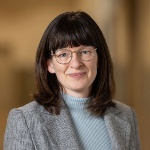Once a year, Nobel Prize winners come together with young researchers from all over the world in Lindau. An invitation to the Lindau Nobel Laureate Meeting is highly regarded among young researchers and is only extended to the world's most promising talents. More than 600 young international researchers traveled to the 74th Lindau Nobel Laureate Meeting, which took place from 29 June to 4 July 2025 and focused on chemistry. After the conference, 18 of them took part in a one-week round trip. The event was organized by Baden-Württemberg International. The program included visits to leading research institutions in the state - including the University of Stuttgart.
Stuttgart offers excellent conditions for young international researchers
On July 8, the Faculty of Chemistry welcomed the group. "Welcome to "Tütftler" state" said Dr. Wolfgang Holtkamp, Senior Advisor for International Affairs at the University of Stuttgart, as he welcomed guests from 13 different countries. In Germany, the term "Tüftler" (tinkerer) refers to someone who approaches technical challenges with patience, curiosity, and meticulous attention to detail. “There are plenty of them in Baden-Württemberg,” Holtkamp said with a wink, noting that the state is among the most innovative regions in both Europe and the world. Holtkamp emphasized that the University of Stuttgart – one of Germany’s leading technical universities and a member of the TU9 alliance – offers excellent conditions for young international researchers.
In addition to cutting-edge research, the University of Stuttgart also offers young talents dedicated support – this was emphasized by the next speaker, Nina Gillé from the Graduate Academy (GRADUS). GRADUS is the central institution of the University of Stuttgart for the promotion of early career researchers. It supports them with a wide range of qualifications, information, advice and mentoring services.
Exciting insights into the Faculty of Chemistry
In the second part of the event, international doctoral and postdoctoral researchers gained fascinating insights into the Faculty of Chemistry. “With eight institutes, we offer an exceptionally wide range of specialized expertise,” says Dean Prof. Cosima Stubenrauch. In addition to the core disciplines of chemistry - inorganic, organic and physical chemistry - technical chemistry, biochemistry, food chemistry, theoretical chemistry, polymer chemistry and materials science are also taught and researched in Stuttgart. An important feature of research at the Faculty of Chemistry is the close cooperation with other natural science and engineering disciplines at the University of Stuttgart. Prof. Cosima Stubenrauch highlighted several examples of interdisciplinary research, including the Collaborative Research Center (CRC) 1333, “Molecular Heterogeneous Catalysis in Defined, Conducive Geometries”; CRC 1667, "Advancing Technologies of Very Low Altitude Satellites (ATLAS)"; and the Research Training Group "EpiSignal – Interaction of Intracellular Signaling Pathways and Chromatin Modification Networks".
Doctoral degree studies, postdoc phase, junior professorship: First-hand information
What is it like to live and conduct research in Stuttgart? Seven junior research group leaders and junior professors in chemistry responded to numerous questions from the engaged audience. "The atmosphere here at the Stuttgart campus is very international, with young researchers from Germany, Iran, Nepal, Italy, Singapore and China working in my team. The working language is English," reported Prof. Franziska Traube from the Institute of Biochemistry.
At the end of the visit, Junior Professors Bertold Rasche (Institute of Inorganic Chemistry) and Deven Estes (Institute of Technical Chemistry) led a guided tour of the laboratories in the Faculty of Chemistry. The visit also featured a lively discussion, with numerous questions from the audience.
At the end of the afternoon, the guests emphasized how valuable and interesting it had been to exchange ideas with young researchers from the University of Stuttgart and thus gain insights into research activities and different paths to a professorship.
Bionic Intelligence Tübingen Stuttgart (BITS) at the 74th Lindau Nobel Laureate Meeting
Prof. Sabine Ludwigs and Prof. Syn Schmitt represented the University of Stuttgart at the 74th Lindau Nobel Laureate Meeting, showcasing the Stuttgart BITS initiative with an exhibition stand on "Soft Robotics with Smart Polymers". Her presentation on 4 July 2025 was part of the science exhibition organized by the state of Baden-Württemberg aboard the MS Sonnenkönigin, which sailed from the port of Bregenz to the island of Mainau that day.
Impressions of the boat trip
Contact

Lena Jauernig
Editor Research / Early Career Researchers






